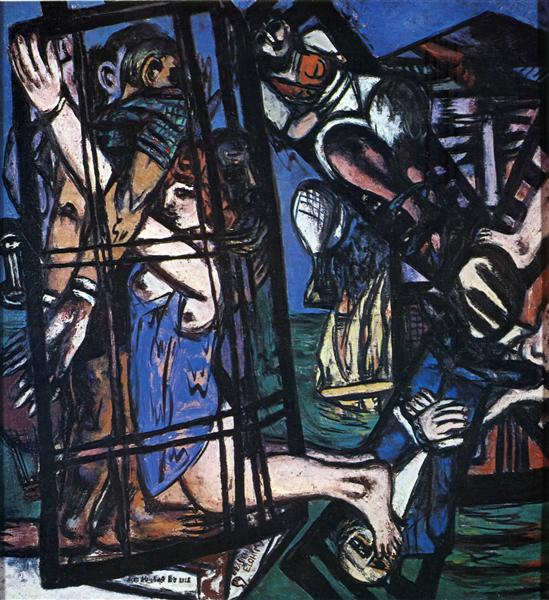Description
The work "El Molino" by Max Beckmann, painted in 1947, is a clear example of the distinctive style that characterizes this German artist, whose works often channel the anguish and complexity of the human being in the context of a tumultuous world. Beckmann, recognized for his ability to merge symbolism and expressionism, enters this work in a representation that evokes both the interior struggle of the individual and the struggle of humanity as a whole.
The composition of "El Molino" reveals a dynamic structure that causes a feeling of movement and restlessness. In the center of the work there is a large mill, which not only serves as an architectural element but also symbolizes the work cycle and the endless production of the human being. This image of the mill is located in an almost dreamlike landscape where heaven and earth seem to converge and distort, suggesting a conventional space and time dissolution. The use of hard and angular lines accentuates the brutality of the environment, while the contours of the mill highlight their monumentality between a palette of terrible and off tones.
The colors used by Beckmann are significant in their emotional load. The palette of the work consists mainly of ocher, brown and gray, which evokes a gloomy and melancholic atmosphere. However, the contrasts of lights and shadows are treated with great mastery, providing an almost three -dimensional dimension to the representation of the mill and its surroundings. These contrasting elements can be interpreted as reflexes of the duality of human existence, between hope and restlessness, between everyday life and internal struggle.
In terms of characters, "El Molino" seems to be absent from direct human figures, although the presence of several vaguely anthropomorphic or symbolic ways could be interpreted as representations of human experience. This suggests a reflection on the individual in relation to the impersonalities of society and history. Instead of focusing on the figure, Beckmann is interested in a broader context that invites the viewer to consider the relationship between man and his conditions. This approach aligns with the conception that the artist has that the human being is trained by the forces that surround him, whether natural or social.
"El Molino" can also be placed within a broader analysis of Beckmann's art, who, after his exile in Germany during the Nazi regime, adapted and transformed his style. The work reflects the heart of its existential concerns in a world marked by violence and uncertainty. His work, which often addresses issues of suffering and resistance, offers a deep vision of the human psyche in times of crisis.
The influence of expressionism manifests itself in the way Beckmann distorts reality to communicate complex emotions, a technique that reminds of contemporary works of other artists of the same time. However, "El Molino" stands out for his ability to combine these elements with a personal symbolism, which allows the work to escape the strict categorization and offer a rich and varied visual experience.
In summary, "El Molino" is not only a powerful visual representation, but also a testimony of the internal struggle of the human being in situations of adversity. It is a work that invites introspection and reflection on the role of the individual in a world that seems to turn incessantly, as suggested by the relentless rotation of a mill. Beckmann, through its unique visual language, offers us a disturbing but deeply captivating look, which resonates with human experience in its entirety.
KUADROS ©, a famous paint on your wall.
Hand-made oil painting reproductions, with the quality of professional artists and the distinctive seal of KUADROS ©.
Art reproduction service with satisfaction guarantee. If you are not completely satisfied with the replica of your painting, we refund your money 100%.

